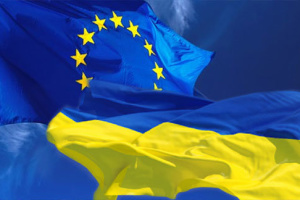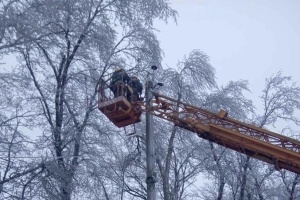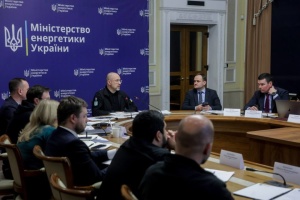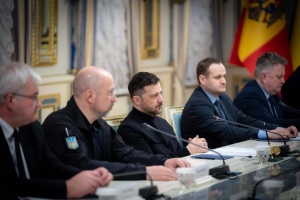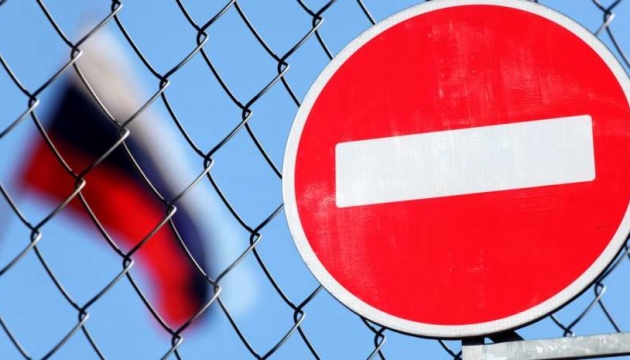
EU approves 12th package of sanctions against Russia
That's according to a press release posted on the website of the European Council, Ukrinform reports.
"With this 12th package, we are putting forward a robust set of new listings and economic measures which will further weaken Russia's war machine. Our message is clear, as I already stated when I chaired the informal Foreign Affairs Council in Kyiv: we remain steadfast in our commitment to Ukraine and will continue to support its fight for freedom and sovereignty," EU High Representative for Foreign Affairs and Security Policy Josep Borrell said.
According to the press release, the 12th package of economic and individual restrictive measures in view of Russia's ongoing war of aggression against Ukraine delivers a further blow to Putin's ability to wage war by targeting high-value sectors of the Russian economy and making it more difficult to circumvent EU sanctions.
In particular, the EU is imposing a prohibition on the direct or indirect import, purchase or transfer of diamonds from Russia. This prohibition applies to diamonds originating in Russia, diamonds exported from Russia, diamonds transiting Russia and Russian diamonds when processed in third countries.
A direct ban applies to non-industrial natural and synthetic diamonds as well as diamond jewelry, as of 1 January 2024. Furthermore, an indirect import ban of Russian diamonds when processed (i.e. cut and/or polished) in third countries, including jewelry incorporating diamonds originating in Russia, will be phased in progressively as of 1 March 2024 and be completed by 1 September 2024. This phasing-in of indirect import bans is justified by the need to deploy a traceability mechanism that enables effective enforcement measures and minimizes disruptions for the EU market.
The ban of Russian diamonds is part of a G7 effort to develop an internationally coordinated diamond ban that aims at depriving Russia of this important revenue source.
Today's decision requires that EU exporters contractually prohibit re-exportation to Russia and re-exportation for use in Russia of particularly sensitive goods and technology, when selling, supplying, transferring or exporting to a third country, with the exception of partner countries. The clause covers prohibited items used in Russian military systems found on the battlefield in Ukraine or critical to the development, production or use of those Russian military systems, as well as aviation goods and weapons.
The Council added 29 new entities to the list of those directly supporting Russia's military and industrial complex in its war of aggression against Ukraine. They will be subject to tighter export restrictions concerning dual use goods and technologies, as well as goods and technology which might contribute to the technological enhancement of Russia's defense and security sector. Some of these 29 entities belong to third countries involved in the circumvention of trade restrictions, or are Russian entities involved in the development, production and supply of electronic components for Russia’s military and industrial complex.
Furthermore, today's decision expands the list of restricted items that could contribute to the technological enhancement of Russia's defense and security sector to include: chemicals, lithium batteries, thermostats, DC motors and servomotors for unmanned aerial vehicles (UAV), machine tools and machinery parts.
The EU also introduced further restrictions on imports of goods which generate significant revenues for Russia and thereby enable the continuation of its war of aggression against Ukraine, such pig iron and spiegeleisen, copper wires, aluminum wires, foil, tubes and pipes for a total value of EUR 2.2 billion per year. A new import ban is introduced on liquefied propane (LPG) with a 12-month transitional period.
The Council decided to introduce some exemptions to import restrictions concerning personal use items, such as personal hygiene items, or clothing worn by travelers or contained in their luggage, and for cars that have a diplomatic vehicle registration plate to enter the EU. Additionally, in order to facilitate the entry into the Union of EU citizens living in Russia, member states can authorize the entry of their cars provided that the cars are not for sale and are driven for strictly personal use.
The transit ban that currently applies to dual use goods and technologies exported from the EU to third countries via the territory of Russia will be extended to all battlefield goods.
In order to further limit circumvention, today’s decision includes a ban on Russian nationals from owning, controlling or holding any posts on the governing bodies of the legal persons, entities or bodies providing crypto-asset wallet, account or custody services to Russian persons and residents.
Additionally, the existing prohibition on the provision of services will be extended to also include the provision of software for the management of enterprises and software for industrial design and manufacture.
The EU is also imposing notification requirements for the transfer of funds outside the EU by any entity established in the EU that is owned or controlled by an entity established in Russia, or by a Russian national or natural person residing in Russia.
The Council is introducing tighter compliance rules to support the implementation of the oil price cap and clamp down on circumvention. Furthermore, a strengthened information sharing mechanism will allow better identification of vessels and entities carrying out deceptive practices, such as ship-to-ship transfers used to conceal the origin or destination of cargo and AIS manipulations, while transporting Russian crude oil and petroleum products.
The Council also decided to introduce notification rules for the sale of tankers to any third country in order to make more transparent their sale and export, in particular in the case of second-hand carriers that could be used to evade the import ban on Russian crude or petroleum products and the G7 Price Cap.
Today's decision adds Switzerland to a list of partner countries which apply a set of restrictive measures on imports of iron and steel from Russia, and a set of import control measures that are substantially equivalent to those of the EU.
It also extends the wind-down periods for the import of specific steel products.
In addition to economic sanctions, the Council decided to list a significant amount of additional individuals and entities.

